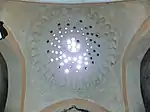Mahmut Pasha Hamam
The Mahmut Pasha Hamam (Turkish: Mahmutpaşa Hamamı) is a historic Ottoman hammam (public bathhouse; Turkish: hamam) in Istanbul, Turkey. Founded by Mahmud Pasha, the grand vizier of Mehmet II, it was completed in 1466 and is one of the oldest surviving bathhouse structures in the city. It was part of the complex of the Mahmud Pasha Mosque, located northeast of the Grand Bazaar. After suffering damage over time, it was restored in the 20th century and now serves as a local shopping centre.

History
The hammam is part of a religious and charitable complex, a külliye, that was founded by Mahmud Pasha, the grand vizier of Sultan Mehmet II Fatih "the Conqueror". The main part of the complex, the Mahmut Pasha Mosque, was completed in 1464 and is one of the earliest Ottoman architectural complexes in Istanbul. The waqf (endowment) of the mosque and its associated charitable buildings was quite extensive, covering a number of different buildings across the surrounding district, which suggests that Mehmet II may have entrusted Mahmud Pasha with developing this district near the commercial heart of the city, just east and north of the area which would become the Grand Bazaar.[1][2][3]
The hammam of the complex, located northwest of the mosque, was completed in 1466 CE, making it the oldest hammam in the city after the Tahtakale Hamam built slightly earlier.[1] It was damaged by fire in 1755 and was restored more recently in 1953. It served as a storage depot for a time but now serves as a shopping centre.[2][4]
Architecture
The hammam's architecture and layout is highly similar to the Tahtakale Hamam built by Mehmet II slightly earlier. It was originally a double hammam, meaning it had separate (but adjacent) facilities for men and for women, including changing rooms and steam rooms for each. The women's section, however, was demolished at some later date to make room for another commercial structure. The remaining structure includes a large domed chamber at the entrance which was originally the men's changing room, which is then followed by two more domed steam rooms: the tepid room and a hot room. The dome of the changing room, the largest in the whole Mahmut Pasha complex, is 17 meters in diameter and has muqarnas squinches at its corners. The dome of the warm room is richly carved and is preceded by a ribbed or scallop-shaped half-dome, which is the earliest surviving examples of a half-dome in Istanbul. The hot room is octagonal, covered by another dome, and has four iwans or niches in the walls which could be used for individual washing. At its center was a large octagonal platform, the göbektaşı, where guests could lay down for massages. Three small domed rooms, used for private washing or services, were accessible on either side (to the north and south).[1][2][3]
 The dome of the changing room
The dome of the changing room The half-dome of the warm room
The half-dome of the warm room The main dome over the warm room
The main dome over the warm room
References
| Wikimedia Commons has media related to Mahmut Pasha Hamam. |
- Kuban, Doğan (2010). Ottoman Architecture. Antique Collectors' Club. pp. 189–191.
- Goodwin, Godfrey (1971). A History of Ottoman Architecture. New York: Thames & Hudson. pp. 109–114. ISBN 0500274290.
- Sumner-Boyd, Hilary; Freely, John (2010). Strolling Through Istanbul: The Classic Guide to the City (Revised ed.). Tauris Parke Paperbacks.
- "Mahmutpaşa Hamamı | Istanbul, Turkey Attractions". Lonely Planet. Retrieved 2020-10-30.
.svg.png.webp)